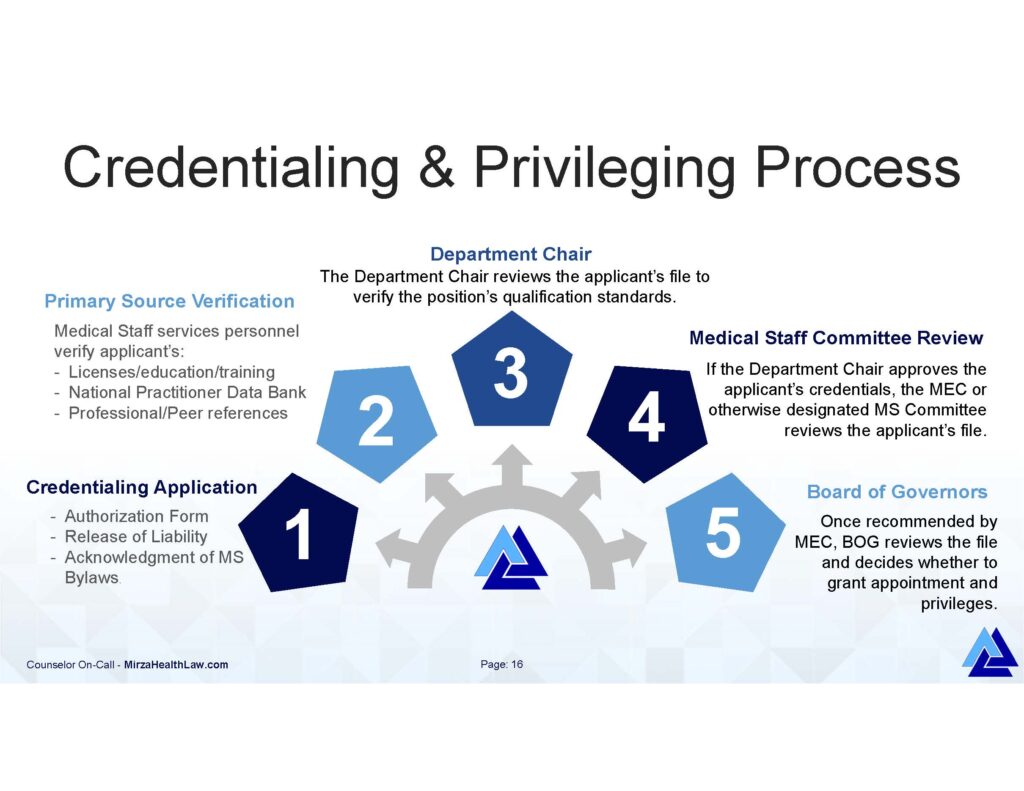By Ben Assad Mirza, Esq., LLM, CPA, MPHA, CHC
At some point in their career, physicians will wonder how to go in-house to work for a large sized system, and how to get privileges inside a hospital. Here is what to expect:
The process to apply for privileges in a hospital is as follows:
1. Request – Send the medical staff office (MSO) for the facility a letter, along with a CV requesting an application packet for your specialty.
2. Application – The medical staff office will then send you an application packet with instructions and forms, including an application, a conflict of interest form, a release of information form, a form where you agree to abide by the hospitals rules and regulations, maybe even a confidentiality agreement, and there will be questions about your license(s) such as: the specialty certification, DEA #, Tax ID, Board Certifications, professional liability insurance.

3. Full and Complete Information is Required – Next you will complete the requested information. Important: if you have issues in your history, such as a: prior law suit, licensing complaints, a potential conflict of interest, a pending law suit or a pending complaint, or any other certification or licensing issue like something that shows up on the National Provider Data Bank (NPDB), or issues where your privileges were reduced or revoked due to behavior or competency issues; you should probably consult an attorney to help you frame the application truthfully and accurately, and to help you maximize your chances of getting approved. Remember, if this information is not accurate, it means that the institution can terminate your privileges at any time. You will likely have to attach a copy of your graduation certificates and licenses with the application.
4. Application Verification – Your application will then be verified by the medical staff office, all licenses, certifications, and prior work history will be checked. The MSO will inquire into your state license, National Practitioners’ Data Bank, Medicare/Medicaid Fraud and Abuse Lists, and all sources where a physician’s disciplinary actions and claims are reported.
5. Department Chair Review – Next your application will go to the Department Chair for review of the file to see if it meets the qualification standards. Important: The approval or disapproval at this step is key. Most applications that are denied are denied at this stage, and the reason stated is “incomplete record or file”; however, if the application proceeds to the next level and is then denied it is a reportable event that you were “denied privileges”. So be very deliberate and careful in the application process. If the application goes bad, it will likely have other professional ramifications.
6. Medical Staff Committee or Credentialing Committee or the Medical Executive Committee will then review your application for its approval.
7. Board of Governors or Board of Trustees or the presiding governing body of the hospital system will then have the last opportunity to review the file and decide whether to grant the appointment and privileges.
If and once you are approved, you will receive a written confirmation letter, and you may be placed on the “Call” schedule; you may also be asked to serve on a medical staff committee. Roughly every 2 years after this appointment, you will likely have to go through a similar disclosure and verification process.
If you would like to find out more about what the power, role, and obligations of a Medical Executive Committee are, or if you would like to find out more about how the peer review process works, please visit www.mirzahealthlaw.com.
If you have questions or issues you need answered by an attorney, please reach out to your select healthcare hospital attorney who has experience in handling these issues; if you don’t, then feel free to call us for we have the experience to guide you through this process.
If you have a unique scenario, email Ben Assad Mirza, Esq., Healthcare Law Partners, LLC, at BAM@MirzaHealthLaw.com.


























